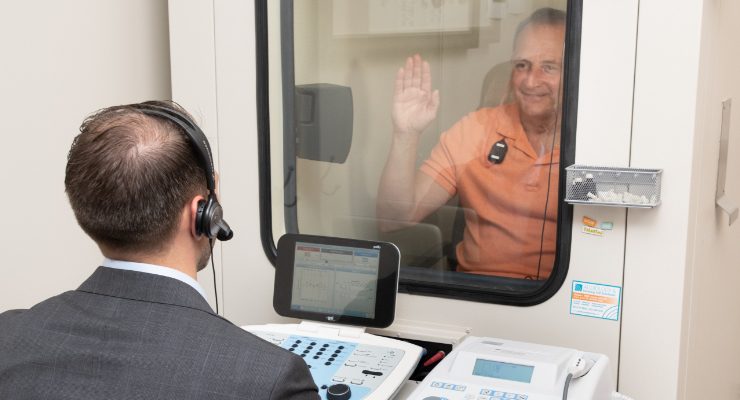We are proud to work closely with many medical professionals. If you are a clinician referring us, we understand you have a lot on your plate. You need to trust the specialist that will take care of your patients’ hearing needs. You can rest assured that Audiology and Hearing Aid Solutions have the expertise to treat your patients’ hearing evaluation, testing and if necessary, hearing loss solutions.
Why is it important to refer your patients to an audiologist?
About 20% of the U.S. population — approximately 48 million Americans — experience changes in hearing significant enough to impact mental and physical health.
Dementia & Hearing Loss
Older adults who wear hearing aids can likely reduce their risk of dementia in half compared to those who don’t manage their hearing loss.
- When left untreated, hearing loss makes it difficult for the brain to hear and retain information.
- This can leave you feeling fatigued, forgetful, and more likely to withdraw from social situations.
- Click to watch video segment that aired on The Today Show on 11/15/2023: How Treatment For Hearing Loss Can Help Reduce Risk Of Dementia
Balance & Hearing Loss
The correlation between falling and hearing loss is significant.
Even a mild degree of hearing loss triples the risk of an accidental fall, with the risk increasing by 140% for every additional 10 decibels of hearing loss.
Falls are the leading cause of accidental death in adults over the age of 65.
- Twenty-nine percent of emergency department visits by persons aged 65+ were related to injury. Unintentional falls accounted for 13.5 percent of those visits.
- Medical costs from falls are about $30 billion a year.
- Research shows that hearing aids made a definitive difference in balance.
- During heel to toe testing, participants with their hearing aids turned on were able to maintain balance for twice as long as when their hearing aids were turned off.
- Click to read more about the link between hearing loss and falling.
Heart Disease & Hearing Loss
Hearing loss occurred 54% more often in individuals with heart disease than in the general population.
- Your inner ear is so sensitive to blood flow that abnormalities in the cardiovascular system could be noted here earlier than in other, less sensitive parts of the body.
- Audiogram patterns correlate strongly with cerebrovascular and peripheral arterial disease and may represent a screening test for those at risk.
Diabetes/Kidney Disease & Hearing Loss
Diabetes affects hearing in several ways:
- Diabetics experience hearing loss at more than double the rate of those without diabetes.
- High blood pressure can damage the small blood vessels in the cochlea of individuals with diabetes, which can result in sudden sensorineural hearing loss.
- When blood sugar rises, nerves in the ears break down — the same nerve damage that causes tingling and other symptoms in the fingertips and toes.
- Our hearing mechanisms rely on specialized hair cells that are fragile and susceptible to the effect of increased glucose in blood.
Cancer Treatment & Hearing Loss
Chemotherapy and radiation can lead to:
- Hearing loss in up to 84% of patients
- Ototoxic drugs can result in sensorineural hearing loss, disequilibrium, or both.
- A much higher risk of noise-induced hearing loss.
- Tinnitus, distorted hearing, auditory hallucinations/phantom sounds, and hyperacusis.
Contact Us




